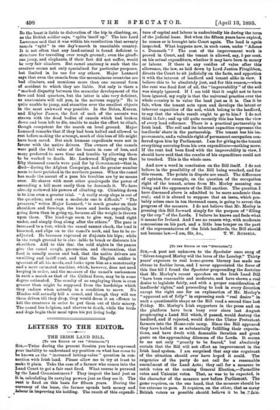LETTERS TO THE EDITOR.
THE IRISH LAND BILL.
[To THE EDITOR Or THE "SPECTATOR."] Sin,—Twice during the present Session you have expressed your inability to understand my position on what has come to be known as the " increased letting-value " question in con- nection with Irish land. Please allow me to try at least to make it plain. Take the case of a farmer who comes into the Land Court to get a fair rent fixed. What course is pursued by the Land Commissioners P They inspect the land just as it is, calculating its carrying powers just as they see it. The rent is fixed on this basis for fifteen years. During the currency of the lease, the farmer spends both money and labour in improving his holding. The result of this expendi- ture of capital and labour is undoubtedly his during the term of the judicial lease. But when the fifteen years have expired, he comes or is brought into Court again. The land is again inspected. What happens now, in such cases, under "Adams v. Dunseath " ? The cost of the improvement work is proved in Court, and the tenant is allowed, say, 5 per cent. on his actual expenditure, whether it may have been in money or labour. If there is any residue of value after this allowance, the law, as laid down by Lord Justice Fitzgibbon, directs the Court to sit judicially on the facts, and apportion it with the interest of landlord and tenant alike in view. I believe this to be absolutely just, and for this reason,—when the rent was fixed first of all, the "improvability " of the soil was simply ignored. If I am told that it ought not to have been ignored, my reply is that the universal practice over the whole country is to value the land just as it is. Can it be fair, when the tenant acts upon and develops the latent or inherent capacities of the soil, which belong to the landlord, to say that the whole result ought to go to him ? I do not think it fair; and up till quite recently this has been the view of every land reformer. There is a practical partnership in Irish land. The soil and its inherent capacities represent the landlords' share in the partnership. The tenant has his im- provements, and a valuable right of permanent occupation con- ferred upon him by Parliament. I am for giving to the tenant everything accruing from his own expenditure—nothing more.. If the rent had been fixed with the improvability in view, I should have said that the results of his expenditure could not be touched. This is the whole case.
And now a word in conclusion on the Bill itself. I do not believe in the possibility of the Bill being wrecked, and for this reason. The points in dispute are small. The difference of opinion, for example, on the question of the occupation right of the tenant, arises from Mr. Morley meaning one thing and the opponents of the Bill another. The question I have discussed above is admitted to be more academic than real ; and it is absurd to suppose that an issue, which pro- bably arises once in ten thousand cases, is going to arrest the progress of the measure. I do not believe that Mr. Morley is pressing this Bill forward simply for the purpose of "filling up the cup " of the Lords. I believe he knows and feels what it means for Ireland. And I see no reason why, with moderate concessions on his part, and a little less temper on the part- of the representatives of the Irish landlords, the Bill should not become law.—I am, Sir, &c., T. W. RUSSELL.


































 Previous page
Previous page